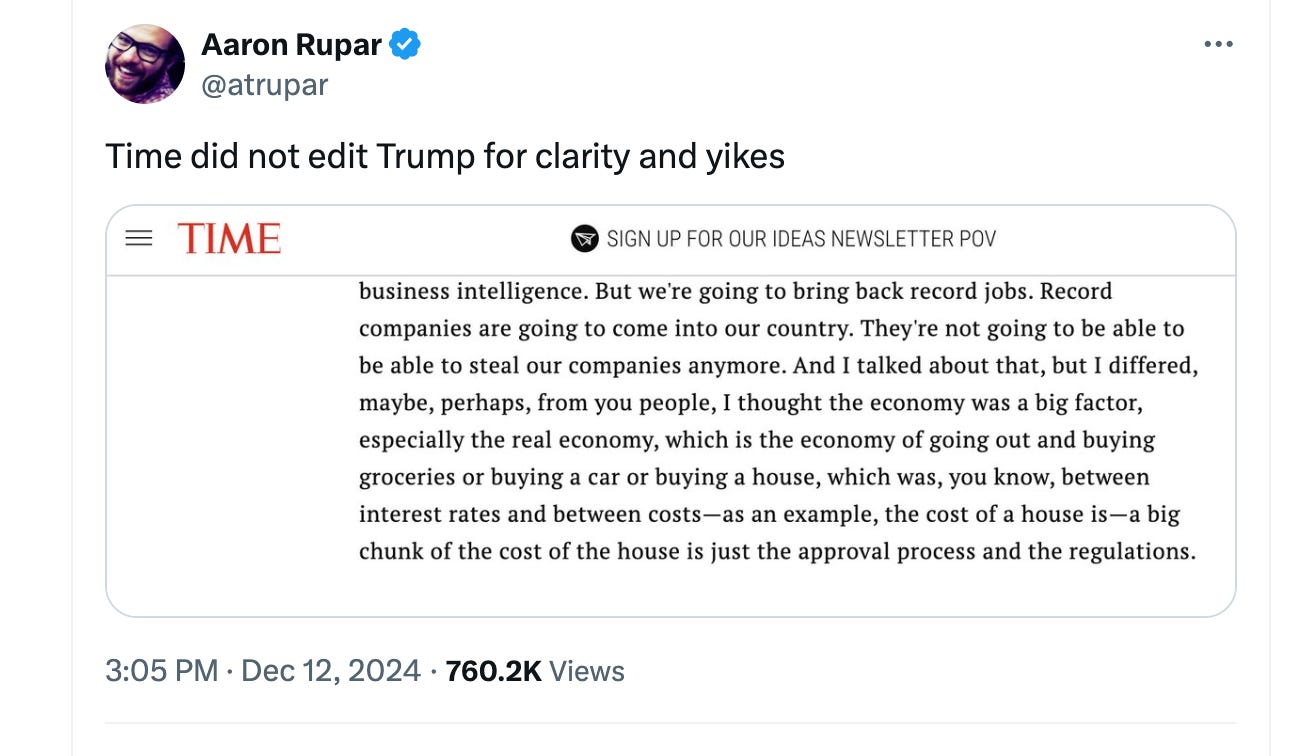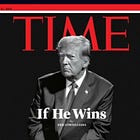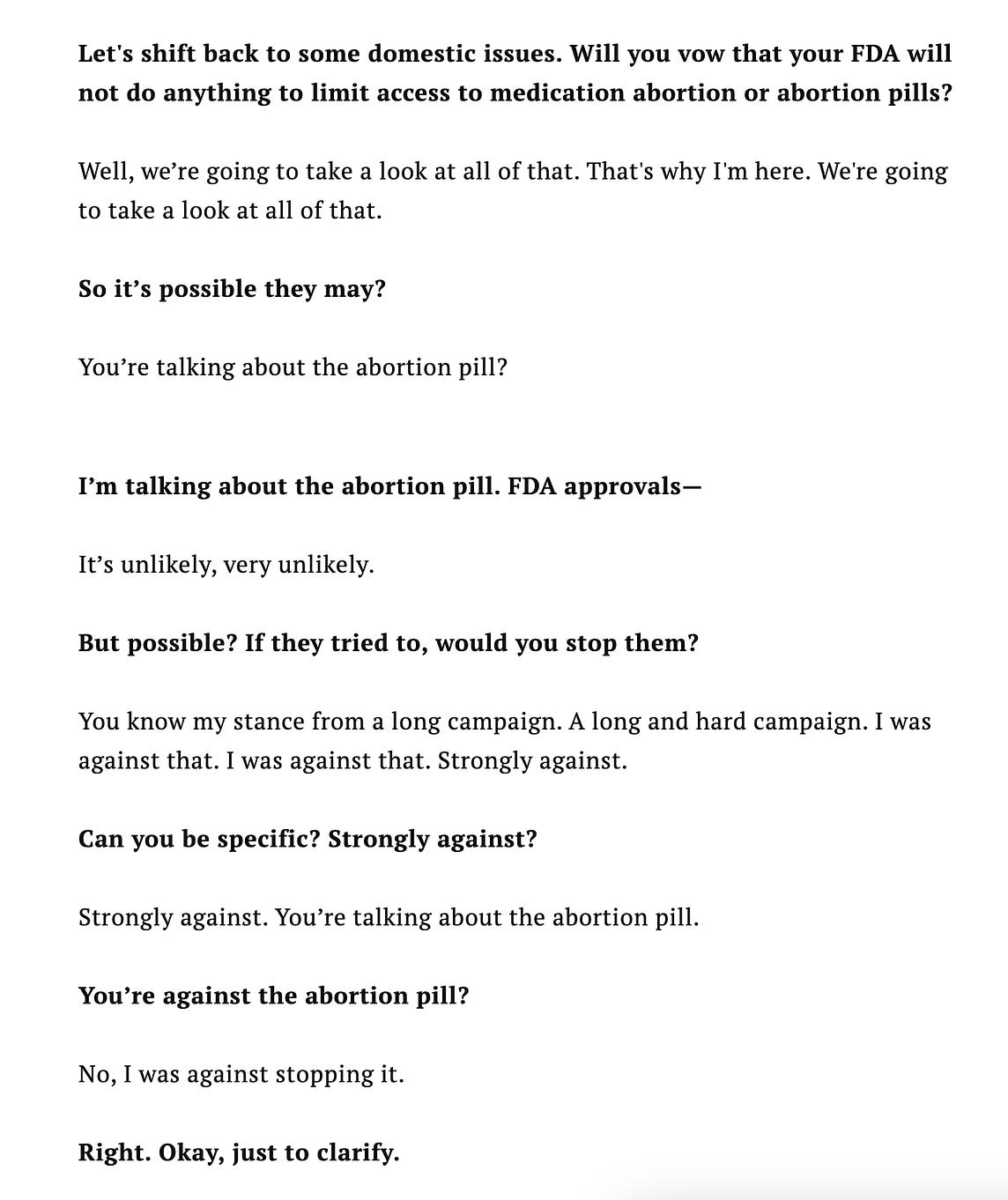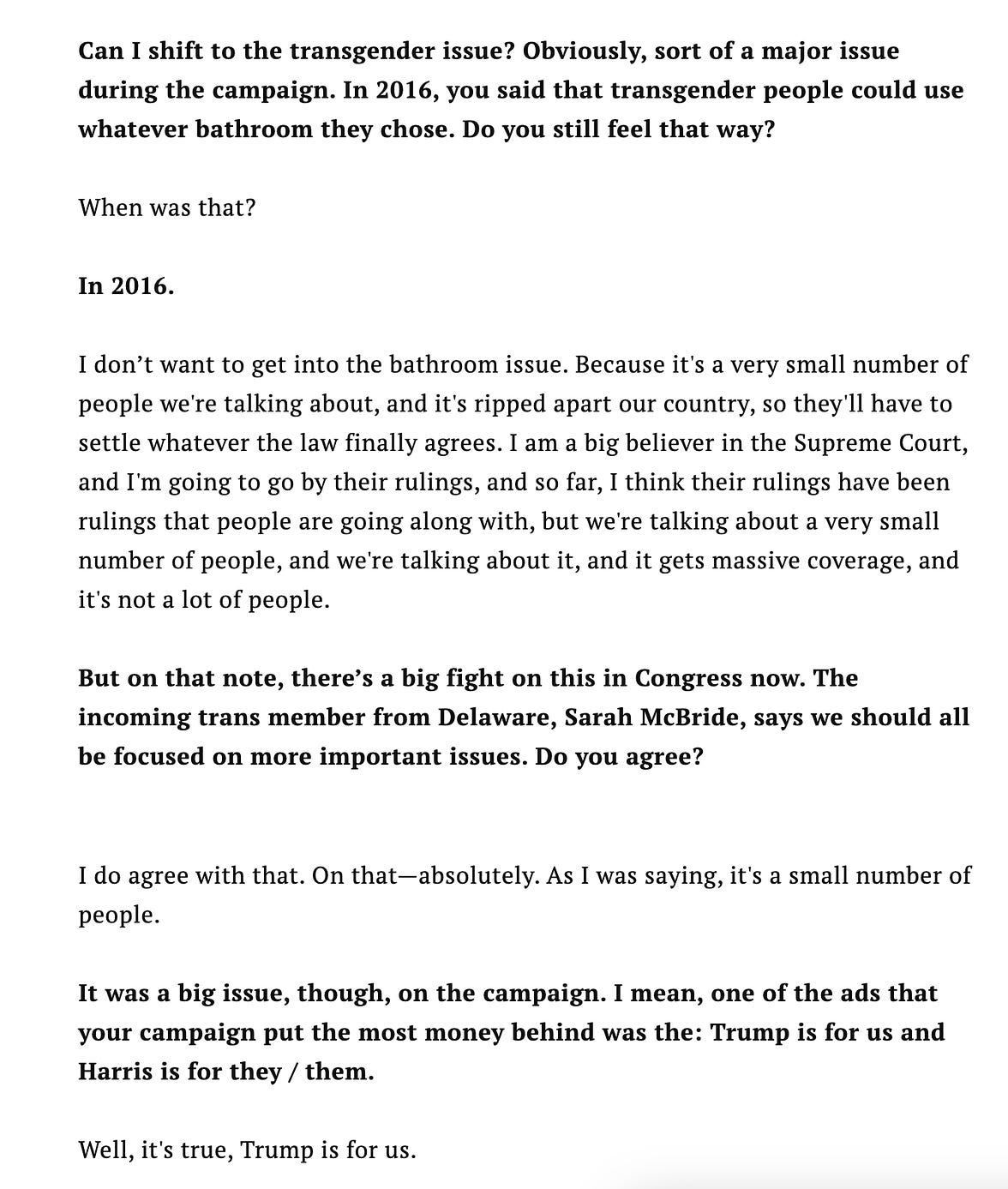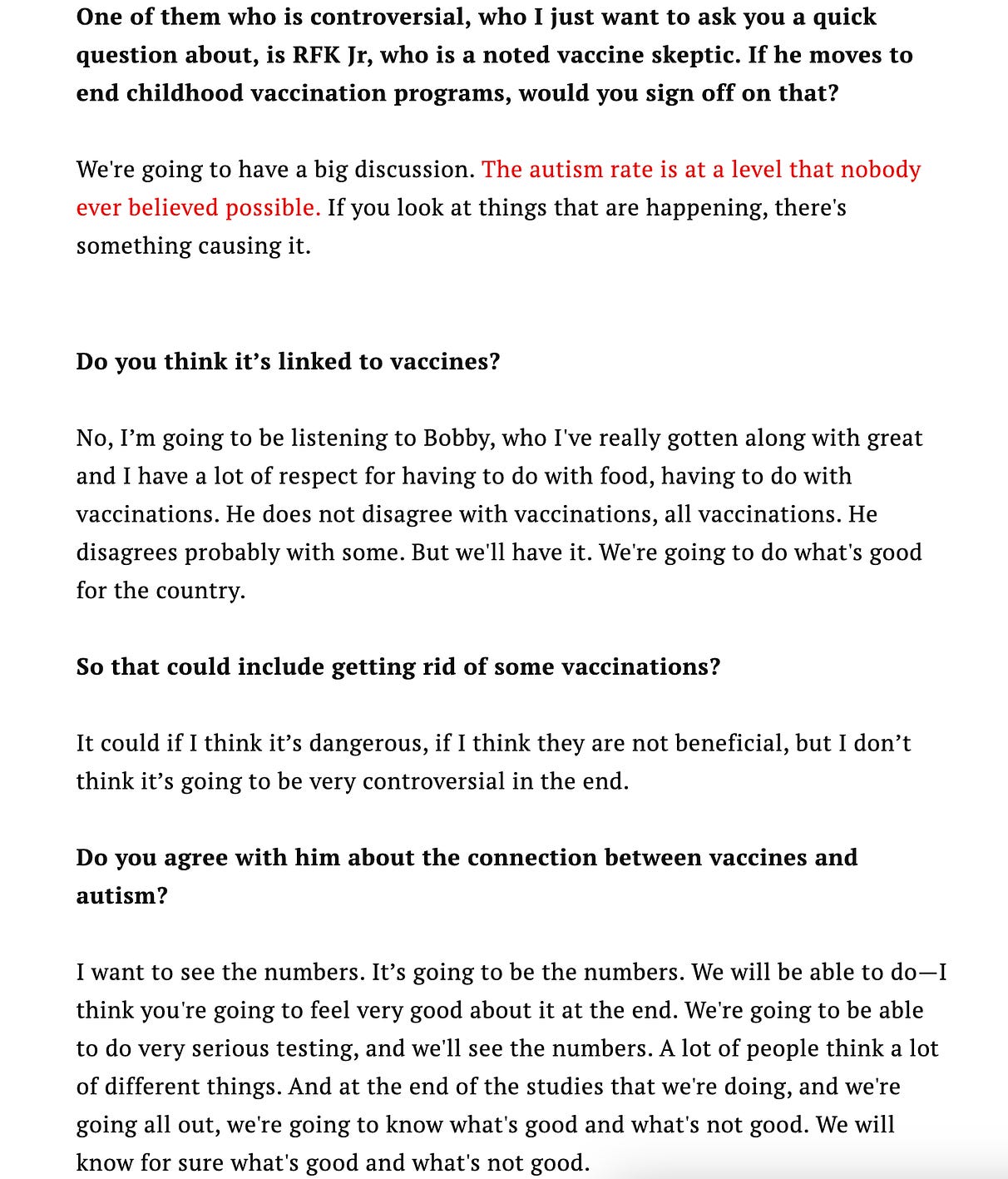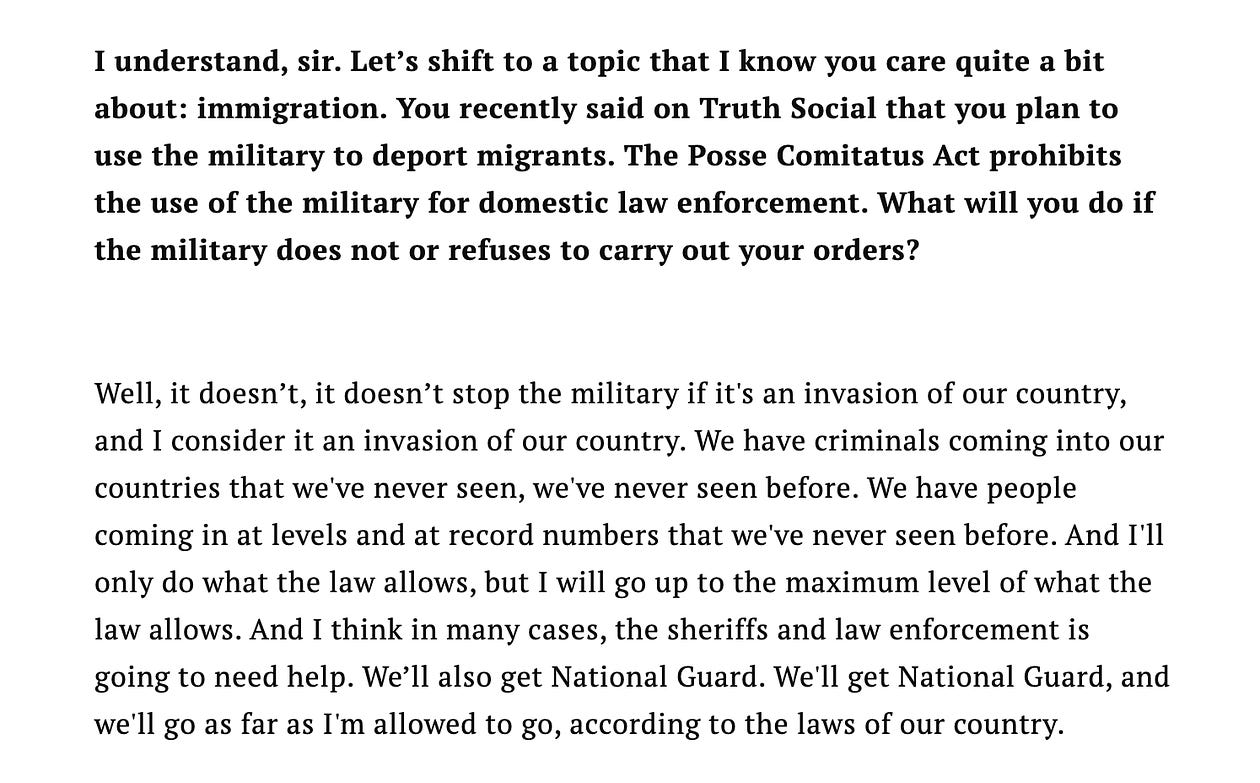Trump's Time interview provides a sobering reminderHe's staggeringly unfit. Always has been. Always will be.In conjunction with naming him “Person of the Year,” Time Magazine last week published a lengthy interview with Donald Trump. The first thing that jumps out is that the conversation wasn’t edited for clarity, meaning the president-elect’s rambling incoherence jumps off the screen. When it’s possible to decipher what Trump is trying to say, it’s apparent he was trying to strike what for him him is a conciliatory tone, at least in comparison with the terrifying interview he did with Time last spring. This time around, he made mouth noises about compromise on abortion, on Ukraine, on Israel, and even, startlingly, on trans issues. So is this the pivot to the center long anticipated by mainstream media? Has Trump finally become president? Well, no, and no again. To quote from our analysis of his previous Time interview, “even after four years as president, Trump has virtually no grasp on any policy issue beyond empty talking points, most of which are lies.” And he ain’t changing. Even when Trump is trying to sound reasonable, he’s hampered by the fact that his knowledge of issues never goes deeper than talking points. Perhaps even worse, he’s clearly in thrall to the world’s worst conspiracy theorists and authoritarian rulers. Among other things, that means that Trump lacks a moral compass. He may half-heartedly try to sound less rabid than usual, but his meandering “weave” still leads him to embrace terrible, harmful policies — among them concentration camps, military action against US civilians, and eliminating life-saving vaccines. In some ways, Trump trying to sound halfway normal is the most frightening Trump. Verbal diarrheaTrump won the election, which means he can’t just lie and promise without consequences; he actually has to attempt to govern. And so he used the Time interview to try to dial back expectations and hedge some of his more nonsensical boasts. The most egregious example involves inflation and grocery prices. Throughout the campaign, Trump insisted that he would not just slow inflation but would actually create deflation. In October, he said on camera that his policies would “rapidly drive prices down” and “bring your grocery bill way down.” But in the Time interview, Trump reverses himself (without of course acknowledging that he’s doing so). Time correspondents asked Trump, “If the prices of groceries don’t come down, will your presidency be a failure?” He demurred, pointing to practical limits on presidential power which he pretended do not exist during the campaign. “I'd like to bring them down. It's hard to bring things down once they're up. You know, it's very hard. But I think that they will.” (Trump then insisted that “energy” would bring down prices, and launched into an incomprehensible anecdote about how cool container ships are, and how that is somehow related to supply chains being broken.) As he did during the campaign, Trump also tried to avoid being pinned down to any actual position on abortion rights. Time asked if his FDA would limit access to abortion pills. Trump vacillated, saying “we’re going to take a look at all of that,” then insisted that he was “strongly against” bans on abortion pills, and then said it would be “highly unlikely” that he would ban the pill — though he refused to say for certain that he would not. This response, for all its obfuscation, makes one thing crystal clear: Trump knows little about abortion policy, refuses to learn anything about it, and when talking about it will simply say whatever his interlocutor wants to hear. This is not very promising for abortion rights, considering the Christofascist loons who will surround Trump once he’s in office. One of the most strikingly bizarre moments in the interview is when Trump tries to present himself as a moderate of sorts on trans issues, despite being fresh off a campaign where he spent millions on viciously transphobic ads. On the stump he spread dangerous lies about trans health care, claiming that public schools are secretly referring students for gender-affirming surgery without parental consent or notification. (This literally never happens.) Yet, when asked about policies affecting trans people by Time, Trump downplayed them and suggested the country should be focused on more important issues. “It’s a very small number of people we’re talking about, and it’s ripped apart our country,” he fulminated — as if his own campaign hadn’t done everything it could to inflame things. As you can see, Trump said he thinks the Supreme Court should rule on trans issues — an ominous statement, given the conservative majority’s recent signals. It’s notable that Trump, at least for the length of this interview, didn’t want to be seen as a leader in oppressing trans people. But the GOP has made it clear that harming them is a priority, and Trump certainly isn’t going to push back even if he intermittently wants deniability for these particular human rights violations. Trump also clumsily tried to be on both sides of questions about Ukraine and Israel. On Ukraine, he kept reiterating that he magically would have prevented the war from happening had he been in office. On Israel, he implied that the conflict will somehow disappear after his inauguration. He also, notably, declined to say that he would oppose Israel annexing the West Bank. Trump is still Trump (derogatory)Amidst all the misty and disingenuous belching of verbiage, Trump did manage to demonstrate that to the extent he’s able to actually follow through on his policy agenda, it’ll be very bad news for the country. He reaffirmed that he wants to shut down the Department of Education, saying he would push for a “virtual closure” of the agency, an ambiguous phrase which seems designed to mean nothing. He then praised Iowa as a model of education even though that state’s education rankings have been dropping under Republican control. Trump also again promised to pardon January 6 insurrectionists on his first day in office. And, chillingly, he suggested he believes in the completely debunked links between autism and vaccines, and said he will give anti-vaxxer, conspiracy theorist, and pro-measles partisan Robert F. Kennedy Jr. a free hand in deciding which vaccines are “dangerous”. (RFK Jr.’s lawyer has been working to revoke FDA approval of the polio vaccine.) Some of Trump’s bleakest comments involved, inevitably, immigration. When Time pointed out that his plan to use the military to deport migrants is illegal under the Posse Comitatus Act, which prohibits the use of the military for domestic law enforcement, Trump simply insisted otherwise. Trump added that he could use the military to prevent “an invasion of our country,” and since he considers undocumented migration to be that, “I will go up to the maximum level of what the law allows,” which he said would involve the National Guard. Time also asked Trump where he would send migrants if their home countries do not want to accept them. He tried to dodge, saying “I’ll get them into every country, or we won’t do business with those countries.” But when pressed, he acknowledged he might in fact might have to build concentration camps to house them. “I don’t care,” he said. “Whatever it takes to get them out.” Deep in the derp“I don’t care” is not generally what you want to hear from a president, especially when he’s discussing plans to conduct militarized deportation raids in parts of the country that don’t want them. But based on this interview, and on the entire rest of his political career, “I don’t care” does seem to sum up Trump’s approach to most issues that don’t directly involve puffing up his ego. After a decade at the center of Republican and American politics, Trump continues to barely pretend to understand the broad outlines, much less the nuances, of his own agenda. When he talks about abortion, or tariffs, or trans people, or concentration camps, or Ukraine, or Gaza, he cheerfully flatters himself and talks about how great he’s going to make everything. But he offers few policy details, and when he does, those details are almost always conspiracy theories and lies. In this interview, Trump veers back and forth between semi-conciliatory rhetoric and spine-chilling promises of atrocity without missing a beat, or, apparently, noticing any incongruity. It’s when Trump is being most “presidential” that he shows just how deep in his own derp he is — and how nonchalantly he spews lies and contemplates violence. Even when Trump dials himself down — or perhaps especially when he does — his blank malice is inescapable. |


